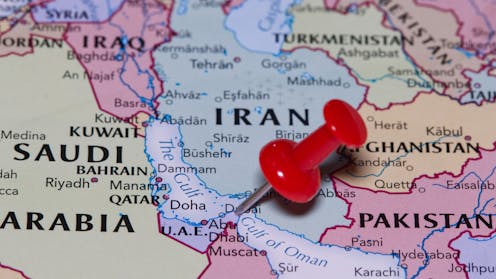Strait of Hormuz: closing vital oil and gas route would disrupt global supplies. How will Australia be affected?
- Written by Sanjoy Paul, Associate Professor in Operations and Supply Chain Management, UTS Business School, University of Technology Sydney

The Iranian parliament has approved the closure of key shipping route the Strait of Hormuz[1], in a move that could further escalate the Israel/Iran war.
The strait lies between Iran and its Gulf Arab neighbours and is used to transport[2] about 20 million barrels per day of oil – the equivalent of 20% of global daily oil consumption.
Since 2020, this critical route has been used to transport[3] an average of 14.8 million barrels a day of crude oil and natural gas liquids, 5.5 million barrels a day of petroleum products and 10.8 billion cubic feet per day of LNG.
The closure of the strait, which will not take effect until endorsed by Iran’s Supreme National Security Council[4], will significantly impact global oil and gas supplies and could potentially create energy crises.
An important route for Asia
In 2024, 84% of the crude oil and natural gas liquids, and 83% of the LNG passed through this channel were destined for Asian countries including China, India, Japan and South Korea[5].
In the first quarter of 2025, China alone imported about 38% of crude oil shipped through the strait[6].
It is likely these countries will be directly impacted by a closure.
What it means for Australia
Only about 15% of Australia’s crude oil and 5% of petroleum products are imported from Middle Eastern countries[7] including Saudi Arabia and the United Arab Emirates.
However, 30% of Australia’s refined oil[8] effectively transits through the Strait of Hormuz. This is because Australia sources refined oil from the Republic of Korea and Singapore that is refined from crude oil from the Middle East[9].
If Australia’s key suppliers are affected by the closure, there could be devastating flow-on effects for the country’s oil supply.
Since the conflict between Iran and Israel started, the oil price has increased by 10%[10]. The closure of the strait could further inflate the oil price globally
Though Australia does not rely directly on crude oil from the Middle East, its reliance on South Korea and Singapore for refined oil is significant. The increased oil price and its impact on the cost of goods and services could also hurt Australia’s fight to control inflation.
Past tensions in the strait
The Strait of Hormuz has never been fully closed[11]. However, it has been disrupted a few times leading to reduced capacity.
Notable disruptions include attacks on commercial ships including oil tankers[12] during the Iran-Iraq war in the 1980s and the tension in the strait between Iranian and US navies in 2007[13].
None of these disruptions led to the closure of the channel so the impact of these disruptions on global oil supply was minimal.
Bypassing the strait
Both Saudi Arabia and the United Arab Emirates have established oil pipelines that could bypass the Strait of Hormuz if it is closed or compromised.
Saudi Arabia’s pipeline can carry five million barrels per day and the emirates’ capacity is 1.5 million barrels per day. This is compared to their production capacities of nine and 3.3 million barrels per day respectively[14].
This could significantly slow down the transportation of crude oil from both countries.
Qatar relies on the Strait of Hormuz to transport nearly all of its LNG shipments. Last week Qatar instructed all LNG carriers to hold off transiting through the strait until the day before loading and to remain east of Hormuz[15]. This has kept their carriers outside the impacted regions.
The limited alternative options and reduced capacities of pipelines could potentially disrupt the global oil and LNG supply.
Potential strategies
If the strait is fully closed, the impacts could be severe, especially for Asian countries which rely on energy from the Middle East.
Many countries, such as China, have oil reserves that can sustain their current oil consumption for about five years[16]. However, many developing countries don’t keep supply inventories.
In the short term, countries should seek to diversify their sources[17] of oil and gas supply. In the long term, they should create a strategic reserve[18] for it.
Supply countries should focus on expanding alternative routes such as pipelines connected to alternative ports.
Most importantly, countries should focus on creating renewable energy sources and speed up their adoption to meet energy needs[19]. In future, renewable energies will be the most viable alternatives to crude oil and LNG amid geopolitical tensions.
References
- ^ the Strait of Hormuz (www.newsweek.com)
- ^ transport (www.cnbc.com)
- ^ transport (www.eia.gov)
- ^ Supreme National Security Council (thehill.com)
- ^ China, India, Japan and South Korea (www.outlookbusiness.com)
- ^ the strait (www.eia.gov)
- ^ Middle Eastern countries (www.environment.gov.au)
- ^ 30% of Australia’s refined oil (www.abc.net.au)
- ^ the Middle East (www.environment.gov.au)
- ^ increased by 10% (www.theguardian.com)
- ^ fully closed (www.reuters.com)
- ^ oil tankers (www.strausscenter.org)
- ^ navies in 2007 (www.aljazeera.com)
- ^ nine and 3.3 million barrels per day respectively (www.reuters.com)
- ^ remain east of Hormuz (www.forbes.com)
- ^ for about five years (www.worldometers.info)
- ^ diversify their sources (www.imf.org)
- ^ strategic reserve (www.sciencedirect.com)
- ^ energy needs (www.un.org)
Authors: Sanjoy Paul, Associate Professor in Operations and Supply Chain Management, UTS Business School, University of Technology Sydney







